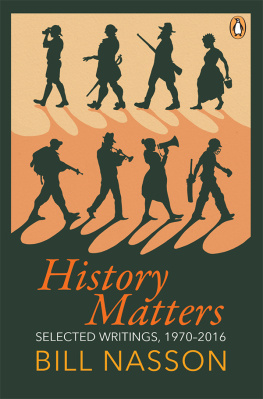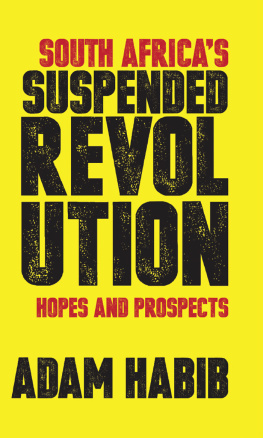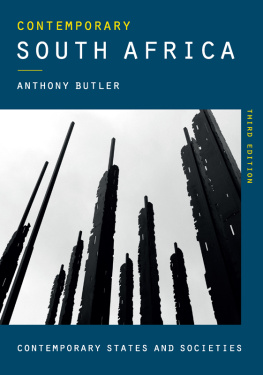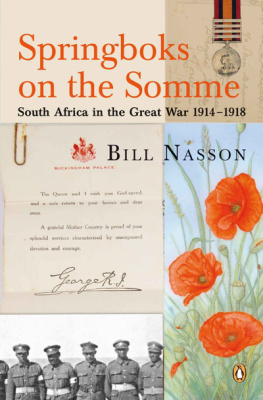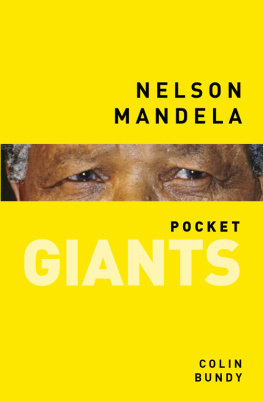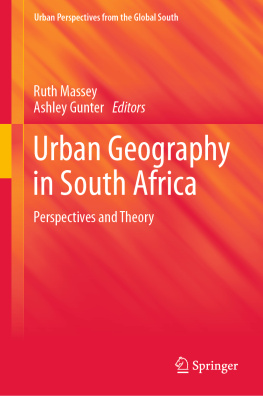PRAISE FOR EARLIER EDITIONS OF
A History of South Africa
An authoritative text by a distinguished historian.Beverley Naidoo,Times Educational Supplement
Highly readable.... For a neatly compressed, readable, authoritative account of South African history, this book will take some surpassing.Paul Maylam,Journal of African History
In A History of South Africa Leonard Thompson again proved his mettle as an historian by augmenting his own insights with the best of those of his erstwhile critics.... The greatest strength of this work is its presentation of such a sweeping and complex history in some of the most lucid prose to be found in such a text. It is an excellent choice for an introductory course, as well as one of the best windows for the general reader to gain perspective on contemporary South Africa.Donald Will,Africa Today
This magisterial history throws a floodlight on South Africas current crisis by examining the past. The absurdity of the apartheid philosophy of racial separatism is underscored by the authors argument (backed with convincing research material) that the genes of the nations first hunter-gatherers are inextricably mixed with those of modem blacks and whites.Publishers Weekly
Should become the standard general text for South African history. It is recommended for college classes and anyone interested in obtaining a historical framework in which to place events occurring in South Africa today.Roger B. Beck,History: Reviews of New Books
A must for any serious student of South Africa.Senator Dick Clark, Director of the Southern Policy Forum, The Aspen Institute, Washington, D.C.
This is a book that fills a great need. As an up-to-date and authoritative summary of South African history by one of the worlds leading experts on the subject, it will tell students, citizens, and policymakers what they need to know about the deep roots of the current South African imbroglio.George M. Fredrickson, Stanford University
This is an outstanding book and in every sense of the word, revisionist. It reflects sound scholarship and is highly readable as well.John S. Galbraith, University of California, San Diego
A HISTORY OF SOUTH AFRICA

LEONARD THOMPSON
A History of South Africa
FOURTH EDITION
REVISED AND UPDATED BY
LYNN BERAT

First edition published 1990. Fourth edition 2014.
Preface to the Fourth Edition, Chapter 10, and Appendix copyright 2014 by Lynn Berat.
Copyright 2000 by Leonard Thompson.
All rights reserved.
This book may not be reproduced, in whole or in part, including illustrations, in any form (beyond that copying permitted by Sections 107 and 108 of the U.S. Copyright Law and except by reviewers for the public press), without written permission from the publishers.
Yale University Press books may be purchased in quantity for educational, business, or promotional use. For information, please e-mail sales.press@yale.edu (U.S. office) or sales@yaleup.co.uk (U.K. office).
Printed in the United States of America.
Library of Congress Control Number: 2013953764
ISBN: 978-0-300-18935-3 (pbk.)
A catalogue record for this book is available from the British Library.
10 9 8 7 6 5 4 3 2 1
CONTENTS
by Lynn Berat
by Lynn Berat
ILLUSTRATIONS
.
Following page 134
MAPS
PREFACE TO THE FOURTH EDITION
South Africa is a place of stunning contrasts: extreme wealth and desperate poverty, heroic devotion to the greater good and klepto- and megalomaniacal self-interest, exceptional natural beauty and environmental desecration. It is, perhaps, not so much a World in One Country as the official tourism slogan once claimed, but a universe where worlds collide, always jarringly, sometimes violently. This, the fourth edition of A History of South Africa, includes a new chapter describing the major developments of the post-Mandela years, a time when the euphoria over the political redemption from apartheid ended and a new struggle for equality and democratic maturity began.
My thanks in this enterprise go to many friends and colleagues in South Africa, the United States, and elsewhere. My deepest gratitude goes to Sarah Miller, my editor at Yale University Press, who endured my frequent delays with equanimity and patience.
This edition is dedicated to the memory of Leonard Thompson.
Lynn Berat
PREFACE TO THE THIRD EDITION
This edition contains two new chapters: a study of the complex political transition process in light of substantial new evidence and an original account of the new South Africa under President Nelson Mandela and his successor, Thabo Mbeki.
Once again I am deeply grateful to Lynn Berat for her knowledge and insights, her careful reading of drafts of the new chapters, and her skills in taming my extremely ill-behaved computer; also to Charles Grench, former editor in chief of Yale University Press, Laura Jones Dooley, associate managing editor, and Ali Peterson, reprints editor, for their friendship and professional skills.
PREFACE TO THE 1995 EDITION
Readers should be aware that, in South Africa as elsewhere, historians are shaped by the context in which they live and work, and that their publications in turnespecially their textbooksinfluence the history of their times. During the British colonial regimes of the nineteenth century, many authors wrote in an imperialist mode. In reaction against that metropolitan bias, British colonists composed works that embodied their perspective as a dominant minority in an African milieu, often at odds with the British metropole; and by the end of the century, when British imperialism was reaching its apogee, Afrikaners were laying the foundations of an exclusive, nationalist historiography. In the segregation and apartheid years, the white regime authorized textbooks and favored other publications in the settler and Afrikaner nationalist traditions of the previous century. Today, those traditions are becoming obsolete. They have been overshadowed by counter-historiographies that, since World War II, have become increasingly rich, varied, and nuanced.
Historians writing from a critical liberal perspective began to expose the racial bias in the established historiography in the late 1920s. From the 1940s onward, their successors placed unprecedented emphasis on the historical experiences of Africans, Indians, and Coloured People. By the 1970s, some scholars were creating a radical historiography, which was influenced by Marxism and highlighted the role of capitalism and the growth of class divisions in South Africa. Initially, a rather clear line demarcated the liberal and the radical perspectives, though each group also contained great differencesthere were variations within the liberal tradition, and radicals drew on rival schools of Marxism. Recently, following the disintegration of the Soviet Union, the collapse of the communist regimes in eastern Europe and elsewhere, and the global movement toward an open economy, the perspectives have converged considerably. With some exceptions, liberals have been radicalized, radicals have been liberalized. In this book, I have drawn on the rich achievements of both streams of contemporary South African historiography.
Next page

